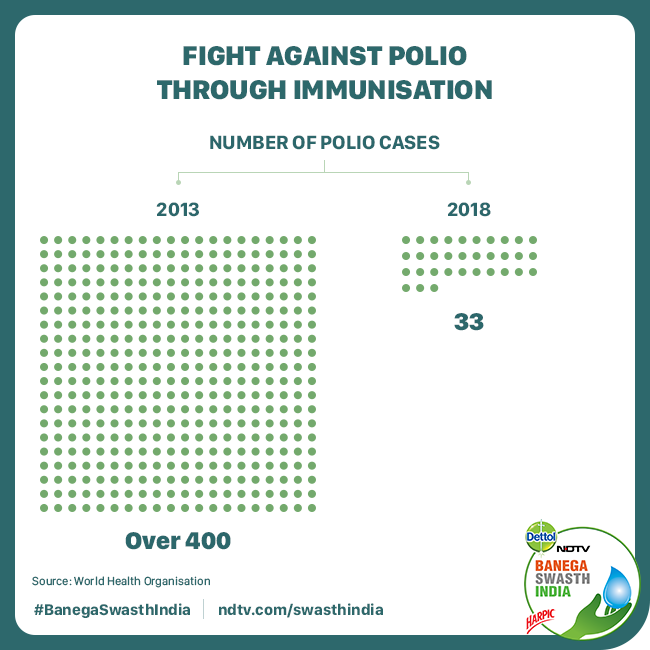New Delhi: Child mortality and morbidity is one of the most important social and economic development indicators for a country and good nutrition intake and preventive healthcare like immunisation and vaccination play significant roles, according to UNICEF. However, due to lack of awareness and proper infrastructure, immunisation coverage in India among children is about 62 per cent, according to the fourth and latest available National Family and Health Survey (NFHS 4) that reports data from the year 2015-16. While immunisation coverage has seen an increase of 19 per cent from NFHS 3 (2005-06) which was 44 per cent then, there is still a long way to go for full immunisation coverage in the country.
Also Read: Much Needs To Be Done On Health Front, Suggests Comprehensive National Nutrition Survey
According to NFHS 4, at 88.4 per cent, Goa has the highest full immunisation coverage among states, while Nagaland has the lowest at 35.7 per cent. The Health Survey of Population Census of India reports that in some places like Malkangiri district in Odisha the immunisation coverage is as low as 29.6 per cent. While talking to NDTV about the poor immunisation coverage in India, Dr. Anil Kumar Aggarwal, Health Specialist, UNICEF Rajasthan said,
There is still a long way to go for achieving universal coverage in terms of full immunisation in India but the available evidences like eradication of polio and reduction in measles, clearly suggest that the investment made in preventive and promotive care yields multi-fold returns on investment, as it not only reduces mortality and morbidity but also leads to healthy life of citizens.
He further said that immunisation is one of the safest, easiest and most cost-effective ways to protect children from life-threatening diseases in their lifetime.
Dr. Shyam Kureja, Head of the Paediatric Department at Max Super Speciality Hospital, Patparganj, Delhi, said that immunisation and vaccine build immunity in the human body and most of these are required to be given more than once to develop sufficient immunity at a defined age and within defined intervals between doses. He said,
If by age of 12 months, a child has received all the scheduled vaccines, then a child is said to be fully immunised. Full Immunisation coverage is an important indicator of Immunisation and outreach health services.
In terms of child immunisation coverage, the NFHS-4 reports that 38 per cent of all children are not able to fully benefit from immunisation services and have been devoid of one or the other important vaccines. The report reveals that among the most important preventive care vaccines for children, the maximum coverage, about 92 per cent, is of BCG (Bacille Calmette Guerin) which protects a child against Tuberculosis. BCG coverage has improved 14 per cent since 2005-06 when it was only 78 per cent. Hepatitis B vaccine coverage, on the other hand, is about 62 per cent as reported for the first time by NFHS 4. Coverage for measles vaccines is about 81 per cent, up from 59 per in 2005-06, for polio vaccines it is about 73 per cent (this was 78 per cent in 2005-06) and for DPT (Diphtheria, Pertussis, Tetanus) the coverage increased from 55.3 per cent in 2005-06 to 78.4 per cent in 2015-16.
Immunisation Programme In India
The Ministry of Health and Family Welfare, Government of India introduced Immunisation Programme in India in 1978 as ‘Expanded Programme of Immunisation’ (EPI). In 1985, the programme was modified as ‘Universal Immunisation Programme’ (UIP), which is one of largest health programmes in the world with 26 million infants and 29 million pregnant women as beneficiaries currently, as per UNICEF data.
In India, the efforts are being made to expand the scope of Immunisation programme which has included many new vaccines in the programme. The platter now includes vaccines for 12 life-threatening diseases including Polio, Diphtheria, Pertussis, Tetanus, Hepatitis-B, Pneumococcal pneumonia, Rotavirus, Miliary tuberculosis, Measles, Rubella and Japanese encephalitis.
Japanese encephalitis vaccine is given in disease-endemic areas and Rotavirus vaccine along with Pneumococcal Conjugate vaccine are being rolled out across the country in a phased manner, informs Dr. Agarwal.
Dr. Kukreja said that India has eradicated deadly diseases like Polio and measles and India is committed to eliminating Rubella. He said that Polio will be soon eliminated from the world and only some cases are being found in Pakistan and Afghanistan.

According to WHO, the number of Polio cases have come down significantly from over 400 in 2013 to 33 in 2018
Also Read: Vitamin D Deficiency May Lead To Muscle Weakness, Reports A Study
Lack Of Awareness – Major Roadblock To 100 Per Cent Immunisation
Dr. Kureja, said, “Literacy and awareness has an important role to play in increasing the immunisation coverage. Districts with higher literacy tend to have higher levels of child immunisation.” World Health Organisation and UNICEF have also found lack of awareness and myths surrounding immunisation as two major challenges in 100 per cent immunisation coverage. Dr. Kukreja asserts that people in rural areas of India lack general information regarding immunisation like schedule of vaccine dose, nearest health centers where the vaccines are available, and hazards of not avoiding a particular vaccine. He also highlighted that there are myths associated with vaccination like vaccination leads to Alzheimer’s diseases in a person, or causes early death.
To improve the coverage of immunisation and increase awareness around it, experts suggest that better IEC (Information, Education and Communication) strategies must be formed and implemented. They recommend that Accredit Social Health Activists (ASHA) and other grassroots workers should be educated about immunisation for increasing the coverage in rural areas.

















